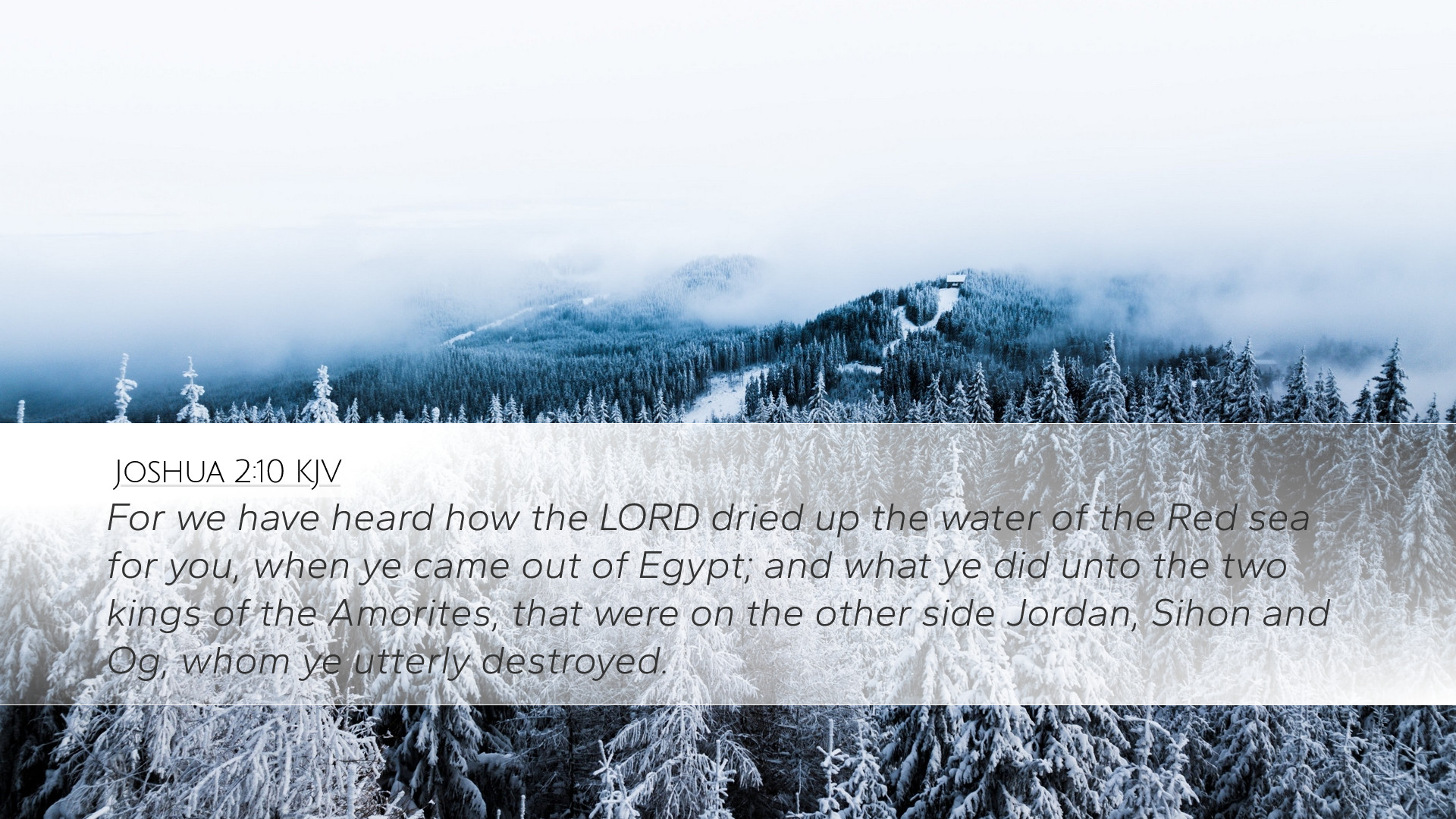Old Testament
Genesis Exodus Leviticus Numbers Deuteronomy Joshua Judges Ruth 1 Samuel 2 Samuel 1 Kings 2 Kings 1 Chronicles 2 Chronicles Ezra Nehemiah Esther Job Psalms Proverbs Ecclesiastes Song of Solomon Isaiah Jeremiah Lamentations Ezekiel Daniel Hosea Joel Amos Obadiah Jonah Micah Nahum Habakkuk Zephaniah Haggai Zechariah MalachiJoshua 2:10
Joshua 2:10 KJV
For we have heard how the LORD dried up the water of the Red sea for you, when ye came out of Egypt; and what ye did unto the two kings of the Amorites, that were on the other side Jordan, Sihon and Og, whom ye utterly destroyed.
Joshua 2:10 Bible Commentary
Commentary on Joshua 2:10
This verse introduces a critical moment in Israel's transition into the Promised Land, marking the interaction between the Israelite spies and Rahab, a Canaanite woman. It serves as a bridge between the past of Israel in the wilderness and their future in the land God promised them.
Context and Framework
The book of Joshua describes the conquest and settlement of Canaan. Chapter 2 narrates the spying mission undertaken by Joshua, where two spies are sent to scout the land, leading them to Rahab's house.
Joshua 2:10 (KJV): "For we have heard how the Lord dried up the water of the Red sea for you, when ye came out of Egypt; and what ye did unto the two kings of the Amorites, that were on the other side Jordan, Sihon and Og, whom ye utterly destroyed."
Summary of Insights
- Historical Significance: Both Matthew Henry and Albert Barnes emphasize the historical context of Israel's miraculous exit from Egypt, which had spread far beyond their borders. Rahab’s acknowledgment of these events signifies that God’s deeds were known among the Canaanites, illustrating the far-reaching influence of God’s acts.
- The Faith of Rahab: Adam Clarke points out that Rahab's declaration reflects her faith in God, recognizing His power over the might of Egypt and His victories in battle. This faith leads her to harbor the spies, highlighting the principle that faith opens the door to God's grace and mercy.
- God’s Sovereignty: The mention of “the Lord dried up the water of the Red Sea” reinforces God’s sovereignty. This is a focal point in various commentaries, noting how God not only delivers but also prepares the hearts of those who will respond to Him in faith, as exemplified by Rahab.
- Understanding the Enemy’s Perspective: The fear of the Israelites in Canaan reveals how God’s actions are recognized even by antagonistic nations. Henry comments on the paralytic fear that gripped Canaanites upon hearing of Israel's conquests, illustrating that God’s fame is a double-edged sword that instills dread but also invites reverence.
- The Canaanite Response: Rahab’s insight into Israel's victories proposes a significant lesson on how non-Israelites perceived God's work, highlighting the universal recognition of God’s power across cultural and national boundaries.
- The Duality of Destruction and Salvation: The narrative points to a crucial biblical motif—the simultaneous occurrence of judgment against some (the Amorites) and grace towards others (Rahab). This parallel is developed further, emphasizing that God's providence can lead to diverse outcomes based on one's response to His revelation.
Theological Implications
- Illustration of Grace: Rahab’s story illustrates divine grace penetrating even into enemy territory. Despite her background as a prostitute, her faith qualifiest her for mercy, paralleling New Testament themes where Jesus welcomes sinners. This notion offers rich theological material for discussions on inclusion and redemption.
- Awareness of God’s Activities: The acknowledgment by Rahab emphasizes the significance of awareness of God’s workings in our lives. Understanding God leads to action—as demonstrated by Rahab’s protection of the spies—serving as a model for believers today.
- Faith and Action: Rahab’s faith is coupled with immediate action. Her decision to safeguard the spies acts as a testament that true faith is demonstrated through works. Clarke articulates that genuine belief produces tangible outcomes.
- Transference of Fear to Faith: The narrative captures the transition from fear of destruction to faith in deliverance. Hearing about the Red Sea crossing and the elimination of the Amorite kings created an environment where Rahab could express faith rather than fear, showcasing how hearing the gospel can transform hearts.
- Preparation for God’s Plan: The Canaanite woman's faith signifies that God's redemptive plan transcends ethnic and social boundaries. The acceptance of outsiders, like Rahab, into the faith community offers a foreshadowing of the global mission established through Christ.
Practical Applications
- Encouragement for Evangelism: This passage assures believers that God's actions are known, and people are seeking truth. It provides a robust foundation for evangelism, reminding Christians that those who seem distant from faith often perceive God's working and are ripe for the message of salvation.
- Reflect on Past Experiences: Just as Rahab recalled Israel’s past victories, believers are encouraged to reflect on God’s faithfulness in their lives. Such reflection can aspire towards nurturing a heart that desires to act in faith.
- A Call to Transcend Social Barriers: Rahab's example calls believers to transcend societal prejudices in sharing the gospel. The practice of extending grace aligns with God's redemptive nature and reinforces the truth that no one is beyond the reach of God's love.
- Faith Motivates Action: Rahab's actions prompted a wider narrative of trust and risk. Faith should compel Christians to act courageously, inspired by God's track record. Practical implications include taking risks to serve, protect, and share the gospel.
- Recognizing God’s Sovereignty: The recounting of God’s past acts encourages humility within the believers’ approach to challenges. They are reminded that God is in control, assuring that faith should be the response to adversity.
Conclusion
Joshua 2:10 encapsulates the stirring interactions between the Israelites and Rahab, emphasizing the far-reaching knowledge of God's power and grace. Through a careful study of this verse and the accompanying commentaries, believers are invited to reflect on God's sovereignty, the nature of faith, and the transformative impact of God's grace in the lives of individuals from all walks of life. The verse serves as a profound revelation of how faith can arise in unexpected places, encourage evangelism, and transform minds toward an inclusive vision of God's redemptive purpose.


